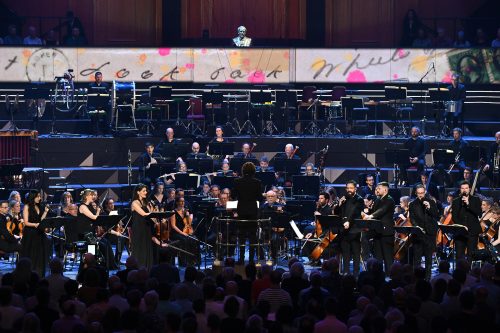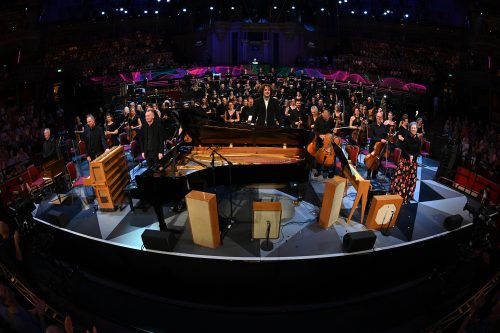Collon and the BBC Philharmonic deliver Anna Clyne and Messiaen to the Proms – Seen and Heard Worldwide



 United Kingdom PROM 15 – Clyne, Messiaen: Steven Osborne (piano), Cynthia Millar (ondes martenot), Jody Elff (dwell electronics), The Swingles, BBC Philharmonic / Nicholas Collon (conductor). Royal Albert Corridor, London, 30.7.2024. (CK)
United Kingdom PROM 15 – Clyne, Messiaen: Steven Osborne (piano), Cynthia Millar (ondes martenot), Jody Elff (dwell electronics), The Swingles, BBC Philharmonic / Nicholas Collon (conductor). Royal Albert Corridor, London, 30.7.2024. (CK)


Anna Clyne – The Attractive Nothings (world premiere)
Messiaen – Turangalîla Symphony
Having loved Masquerade, Anna Clyne’s tackle London’s eighteenth-century pleasure gardens, a few years in the past, I used to be very a lot wanting ahead to The Attractive Nothings, her response to Emily Dickinson’s poetry: this BBC Promenade started with its world premiere, carried out by the BBC Philharmonic, with whom Clyne is Composer in Affiliation. About Messiaen’s Turangalîla Symphony, which was to comply with, my emotions have been combined: extra on this later.
There are three parts to Clyne’s setting: two of them, on this efficiency, from America, Clyne’s residence. The phrases have been entrusted to The Swingles (welcome guests); the orchestra supplied the musical commentary, augmented by Jody Elff’s dwell electronics. The outcomes weren’t merely accessible (as one anticipated), however lovely. Other than one or two results, the electronics have been in no way invasive: they have been used mainly to govern the acoustic, to supply what I’m tempted to name sonic bloom (whereas The Swingles have been singing one thing near Renaissance polyphony we’d have been in a cathedral). Within the huge intimacy of the Royal Albert Corridor the impact was magical (a phrase I over-use: however what different phrase will do? Music within the presence of an viewers is, or ought to be, a type of magic).
Clyne’s chosen poems and fragments by Emily Dickinson are a mirrored image on an implied narrative, enclosed by her poignant enchantment to a world that has by no means seen, not to mention validated, her life: ‘That is my letter to a World That by no means wrote to Me’. Together with the sense of loneliness and isolation is an equally poignant meditation on the brevity of life, and the inevitability with which our moments of intense expertise slip instantly into the previous. Clyne’s orchestral accompaniment is chameleonic: easy, elaborate, highly effective, wealthy, chorale-like, rhythmically insistent, chattering, swirling, pastoral and so forth. Within the fourth track the music appeared inside hailing distance of Mike Oldfield nation, and none the more severe for that.
Because the ending approached the phrases and music appeared to me to evoke two farewells: Prospero’s (’We’re such stuff as goals are made on’) and the funeral march in Der Abschied (the final track of Mahler’s Das Lied von der Erde). Clyne chooses to cap her highly effective conclusion with a shining and apparently triumphant main chord.
The looks of Nicholas Collon and The Swingles to carry out the work triggered an nearly raucous welcome from the viewers: they have been much more vociferous of their approval on the finish. The thrill within the corridor all through the interval was such that the small however valiant band of seasoned Prommers who make a nightly enchantment in help of musical charities was all however inaudible. I haven’t witnessed that earlier than: it was testomony, I suppose, to the joy a dwell efficiency of Messiaen’s unbridled extravaganza generates. I’ve solely heard it in live performance as soon as, and on that event André Previn was conducting. A very long time in the past: loads of time – a long time – for my prejudices in regards to the piece to harden.
It’s simply too schmaltzy. All that high-flown stuff about bodily and religious love is couched in music that’s the equal of unhealthy Catholic statuary. The love theme is a sweetened model of the primary 4 notes of the Tristan Prelude (that is one – and far the largest – of a trilogy of works associated to Tristan und Isolde) capped by a falling fourth like a snug post-coital sigh, harmonised for a Palm Courtroom orchestra or a Wurlitzer. An excessive amount of bling. In my reminiscence, the sixth motion – The Backyard of Love’s Sleep – is the worst offender: I’ve at all times suspected that when the younger Pierre Boulez described the work as bordello music he had this motion in thoughts.
Think about my shock, then, when it was this motion that switched me again on to the work. Collon saved the swooning strings very a lot within the background; we have been free to focus on Steven Osborne’s piano enjoying – birdsong, swimming pools of silence, tiny detonations like necklaces falling into water. It was mesmerising. After all I had loved the earlier motion, the cheerfully loopy Pleasure of the Stars’ Blood – particularly the demented piano break simply earlier than the statue theme lumbers in – however it was right here that I actually began to hear. I loved Turangalîla II and Turangalîla III, madcap rhythmic experiments like some loopy Heath Robinson contraption prone to explode at any second; The Growth of Love, with returns of the statue theme, the flower theme and that blowsy love music: and the finale, setting off like a breezy cowboy soundtrack with clopping woodblock. There was a palpable thrill within the corridor as the tip approached: the ultimate chord was satisfyingly lengthy and loud, and so was the ovation.


Plaudits to Collon and the BBC Philharmonic for his or her whole dedication; Collon appeared tirelessly tuned to the music’s cosmic vitality, and the gamers tirelessly responded. Kudos too to the busy row of keyboards – Cynthia Millar, veteran ondes martenot participant, Ian Buckle on celesta, Paul Janes on keyed glockenspiel and Osborne – for me the hero of the efficiency – on the piano. He shall be again on Sunday for Rhapsody in Blue.
So, a memorable night: the warmth including a contact of delirium to the final pleasure. And sure, it’s a excellent work for the Proms, not least for its theatricality and visible splendour, with eight of the percussion gamers (there have been extra down the facet) above the remainder of the orchestra in an unbroken line alongside the highest step. I believe my abiding visible reminiscence shall be of seven of them, simply earlier than the tip, brandishing massive, brightly colored pairs of maracas above their heads.
Chris Kettle

